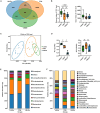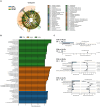Effects of maternal advanced lipoxidation end products diet on the glycolipid metabolism and gut microbiota in offspring mice
- PMID: 38962449
- PMCID: PMC11220281
- DOI: 10.3389/fnut.2024.1421848
Effects of maternal advanced lipoxidation end products diet on the glycolipid metabolism and gut microbiota in offspring mice
Abstract
Introduction: Dietary advanced lipoxidation end products (ALEs), which are abundant in heat-processed foods, could induce lipid metabolism disorders. However, limited studies have examined the relationship between maternal ALEs diet and offspring health.
Methods: To investigate the transgenerational effects of ALEs, a cross-generation mouse model was developed. The C57BL/6J mice were fed with dietary ALEs during preconception, pregnancy and lactation. Then, the changes of glycolipid metabolism and gut microbiota of the offspring mice were analyzed.
Results: Maternal ALEs diet not only affected the metabolic homeostasis of dams, but also induced hepatic glycolipid accumulation, abnormal liver function, and disturbance of metabolism parameters in offspring. Furthermore, maternal ALEs diet significantly upregulated the expression of TLR4, TRIF and TNF-α proteins through the AMPK/mTOR/PPARα signaling pathway, leading to dysfunctional glycolipid metabolism in offspring. In addition, 16S rRNA analysis showed that maternal ALEs diet was capable of altered microbiota composition of offspring, and increased the Firmicutes/Bacteroidetes ratio.
Discussion: This study has for the first time demonstrated the transgenerational effects of maternal ALEs diet on the glycolipid metabolism and gut microbiota in offspring mice, and may help to better understand the adverse effects of dietary ALEs.
Keywords: advanced lipoxidation end products; glycolipid metabolism; gut microbiota; maternal diet; offspring.
Copyright © 2024 Pang, Zhang, Zhang, Chen, Han and Yang.
Conflict of interest statement
The authors declare that the research was conducted in the absence of any commercial or financial relationships that could be construed as a potential conflict of interest. The reviewer XJ declared a past co-authorship with the author BZ to the handling editor.
Figures








Similar articles
-
The dynamic effects of maternal high-calorie diet on glycolipid metabolism and gut microbiota from weaning to adulthood in offspring mice.Front Nutr. 2022 Jul 28;9:941969. doi: 10.3389/fnut.2022.941969. eCollection 2022. Front Nutr. 2022. PMID: 35928844 Free PMC article.
-
Digestibility of Malondialdehyde-Induced Dietary Advanced Lipoxidation End Products and Their Effects on Hepatic Lipid Accumulation in Mice.J Agric Food Chem. 2023 Jul 12;71(27):10403-10416. doi: 10.1021/acs.jafc.3c01956. Epub 2023 Jun 30. J Agric Food Chem. 2023. PMID: 37390008
-
Maternal Folic Acid Supplementation during Pregnancy Prevents Hepatic Steatosis in Male Offspring of Rat Dams Fed High-Fat Diet, Which Is Associated with the Regulation of Gut Microbiota.Nutrients. 2023 Nov 8;15(22):4726. doi: 10.3390/nu15224726. Nutrients. 2023. PMID: 38004120 Free PMC article.
-
Nutrition of the critically ill - emphasis on liver and pancreas.Hepatobiliary Surg Nutr. 2012 Dec;1(1):25-52. doi: 10.3978/j.issn.2304-3881.2012.10.14. Hepatobiliary Surg Nutr. 2012. PMID: 24570901 Free PMC article. Review.
-
Advanced glycoxidation and lipoxidation end products (AGEs and ALEs): an overview of their mechanisms of formation.Free Radic Res. 2013 Aug;47 Suppl 1:3-27. doi: 10.3109/10715762.2013.815348. Free Radic Res. 2013. PMID: 23767955 Review.
References
-
- Muszyński S, Hułas-Stasiak M, Dobrowolski P, Arciszewski MB, Hiżewska L, Donaldson J, et al. . Maternal acrylamide exposure changes intestinal epithelium, Immunolocalization of leptin and ghrelin and their receptors, and gut barrier in weaned offspring. Sci Rep. (2023) 13:10286. doi: 10.1038/s41598-023-37590-3, PMID: - DOI - PMC - PubMed
LinkOut - more resources
Full Text Sources
Miscellaneous

